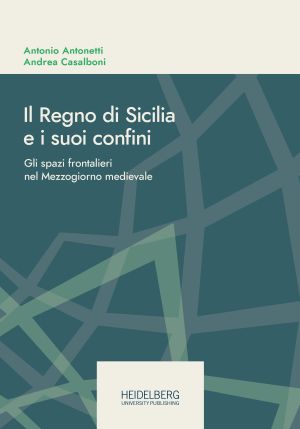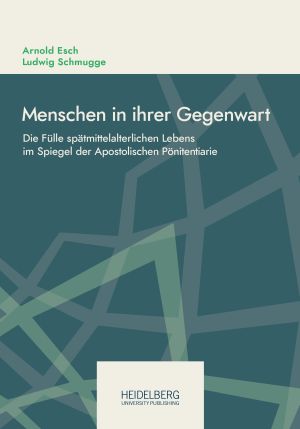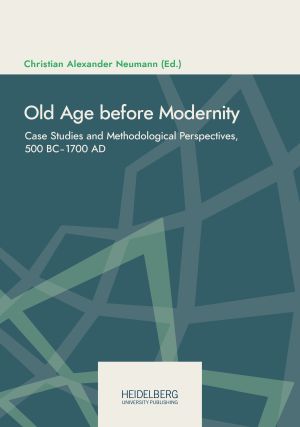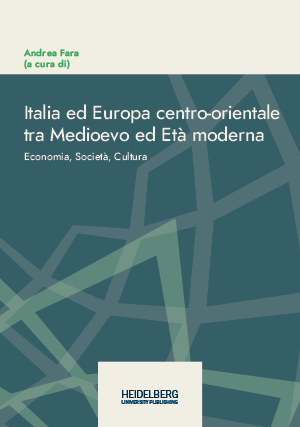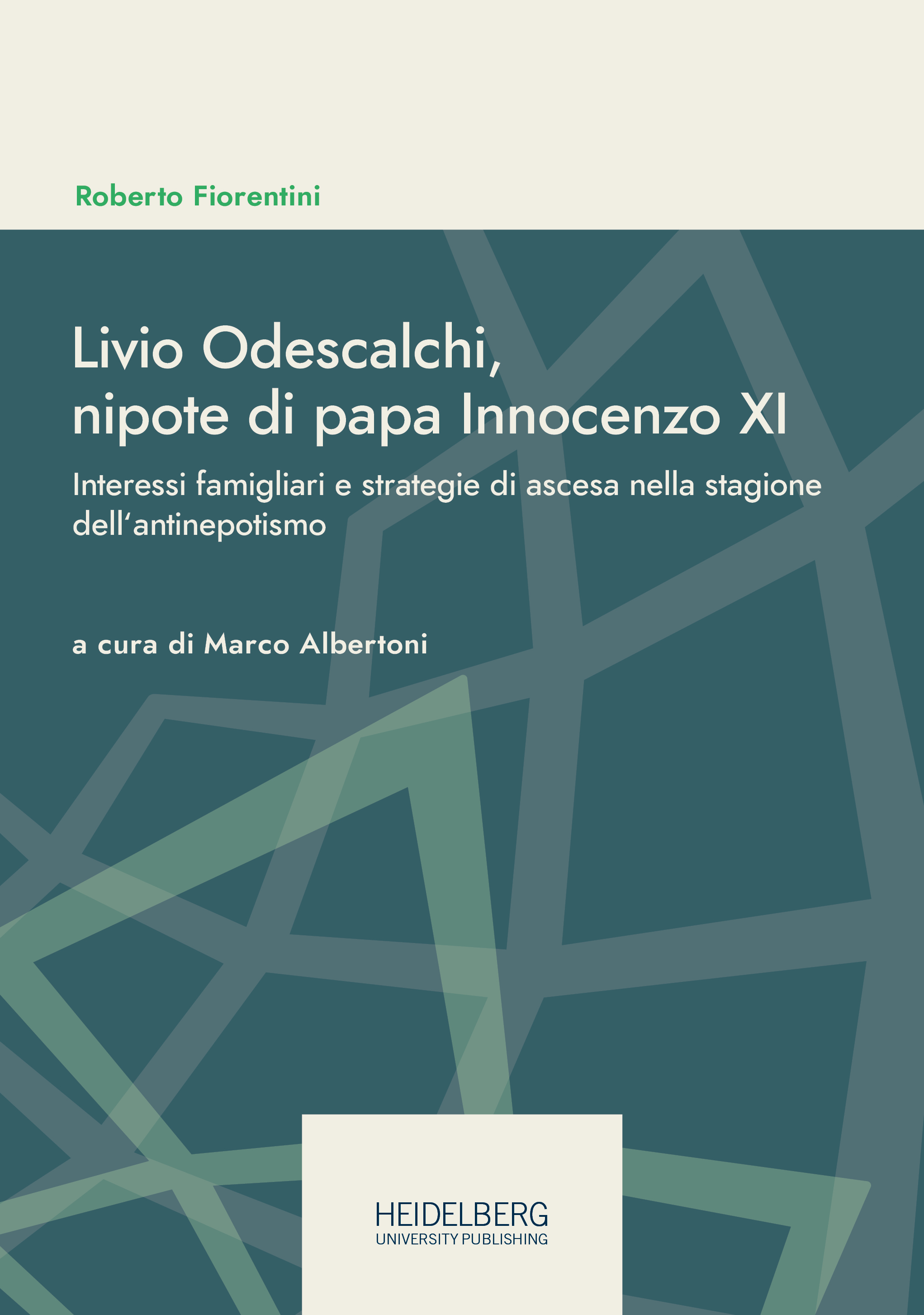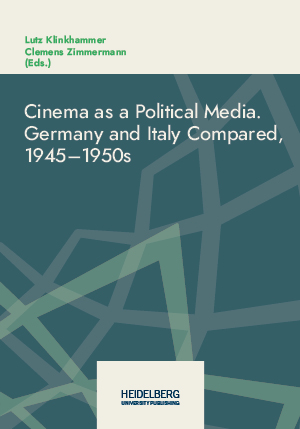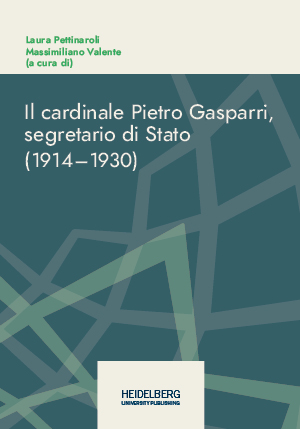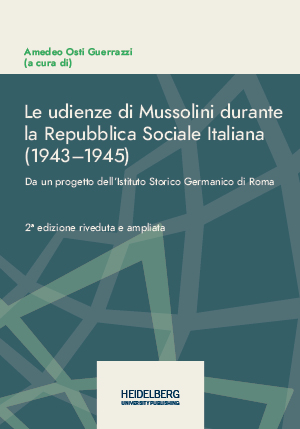Online-Schriften des DHI Rom. Neue Reihe
Pubblicazioni online del DHI Roma. Nuova serie
Online-Schriften des DHI Rom. Neue Reihe | Pubblicazioni online del DHI Roma. Nuova serie è una collana open access dell’Istituto Storico Germanico di Roma. In essa si pubblicano, in varie lingue, monografie, volumi collettanei ed edizioni di carattere scientifico sulla storia d'Italia e della musica italiana, nonché sulla storia dei rapporti italo-tedeschi, in contesti transregionali e transnazionali; l'arco temporale coperto si estende dal medioevo al passato più recente. Tutti i volumi sono sottoposti a doppia blind peer review.
I volumi 1 e 2 e la prima edizione del volume 3 sono stati pubblicati sia sul sito web del DHI Roma che sulla piattaforma della fondazione Max Weber perspectivia.net.
Online-Schriften des DHI Rom. Neue Reihe | Pubblicazioni online del DHI Roma. Nuova serie is an open access series edited by the German Historical Institute in Rome. In various languages it publishes monographs, collective volumes and scientific editions on the history of Italy and Italian music as well as on the history of Italian-German relations in trans-regional and transnational contexts, covering the time frame between the Middle Ages to recent past. All volumes are subject to double-blind peer review.
Volumes 1 and 2 as well as the first edition of volume 3 have been published on the website of the DHI Rom and on the publication platform of the Max Weber Foundation perspectivia.net.
Online-Schriften des DHI Rom. Neue Reihe | Pubblicazioni online del DHI Roma. Nuova serie è una collana open access dell’Istituto Storico Germanico di Roma. In essa si pubblicano, in varie lingue, monografie, volumi collettanei ed edizioni di carattere scientifico sulla storia d'Italia e della musica italiana, nonché sulla storia dei rapporti italo-tedeschi, in contesti transregionali e transnazionali; l'arco temporale coperto si estende dal medioevo al passato più recente. Tutti i volumi sono sottoposti a doppia blind peer review.
I volumi 1 e 2 e la prima edizione del volume 3 sono stati pubblicati sia sul sito web del DHI Roma che sulla piattaforma della fondazione Max Weber perspectivia.net.
Online-Schriften des DHI Rom. Neue Reihe | Pubblicazioni online del DHI Roma. Nuova serie is an open access series edited by the German Historical Institute in Rome. In various languages it publishes monographs, collective volumes and scientific editions on the history of Italy and Italian music as well as on the history of Italian-German relations in trans-regional and transnational contexts, covering the time frame between the Middle Ages to recent past. All volumes are subject to double-blind peer review.
Volumes 1 and 2 as well as the first edition of volume 3 have been published on the website of the DHI Rom and on the publication platform of the Max Weber Foundation perspectivia.net.
Online-Schriften des DHI Rom. Neue Reihe | Pubblicazioni online del DHI Roma. Nuova serie
Editor
Prof. Dr. Alexander Koller
E-Mail: koller@dhi-roma.it
Deutsches Historisches Institut Rom (DHIR)
Coming Soon
I Comuni cittadini italiani
Il volume raccoglie le recenti tendenze di ricerca analizzando i comuni italiani alla luce dei concetti guida di „protagonisti“, „artefatti“ e „processi“. Con queste categorie di indagine, che riprendono approcci di ricerca emergenti e particolarmente vivaci, si forniscono nuove prospettive inerenti agli sviluppi comunali. Mettendo in luce interdipendenze e spazi di interazione finora inesplorati, nonché canali di comunicazione e trasformazioni precedentemente trascurati, i contributi consentono una migliore comprensione degli intrecci di relazioni e delle dinamiche della vita quotidiana comunale.
The volume combines recent research trends, investigating the Italian city communes in light of the key concepts „actors“, „artifacts“, and „processes“. These analytical categories specifically address newly emerging and particularly dynamic research approaches, offering a novel perspective on the development of the commune. By revealing previously overlooked interdependencies and areas of interaction, as well as hitherto neglected communication channels and transformations, the contributions enable a better understanding of relational networks and the evolution of daily life within the communes.
Published so far
Il Regno di Sicilia e i suoi confini.: Gli spazi frontalieri nel Mezzogiorno medievale
Sotto l’etichetta “confine” si può includere un ampio spettro di fenomeni: limiti geografici, delimitazioni politiche, aree di controllo militare e zone porose di interazione. Questo volume adotta un focus interdisciplinare sullo spazio di confine come luogo di contatto e contrasto, un’area di scambio pacifico e violento e di mobilità di idee e persone dove gli attori sociali impiegano lo spazio come elemento strutturale di organizzazione o adattamento della loro esistenza. Questo libro esamina il caso del Mezzogiorno tra l’XI e il XV secolo ed esplora la storia istituzionale dello spazio della frontiera terrestre e le dinamiche relative alla frontiera marittima e le sue implicazioni commerciali, politiche e sociali.
The label “border” can encompass a wide range of phenomena: geographical limits, political boundaries, areas under military control, and porous zones of interaction. This volume takes an interdisciplinary approach, viewing the border space as a place of contact and contrast, an area of both peaceful and violent exchange, of mobility of ideas and people, a structural element deployed by social actors to organise or adapt their own existence. The book examines the case of southern Italy (Mezzogiorno) between the 11th and 15th centuries, exploring the institutional history of land and sea border dynamics, and related commercial, political and social implications.
Menschen in ihrer Gegenwart: Die Fülle spätmittelalterlichen Lebens im Spiegel der Apostolischen Pönitentiarie
Questa raccolta di saggi, frutti di ricerche svolte da Arnold Esch e Ludwig Schmugge nell’arco di oltre trent’anni, esplora le fonti provenienti dall’archivio della Penitenzieria apostolica, il supremo tribunale della Chiesa cattolica in materia di indulgenze e dispense. Più precisamente, si tratta dei registri di tutte le suppliche che, arrivate da tutto il mondo della cristianità latina, vennero accolte positivamente. Che tipo di fonti sono e perché andrebbero studiate? Come sono state scoperte e rese accessibili alla ricerca? Quali nuove prospettive si aprono attraverso la loro analisi? Dalle risposte dei due autori si possono trarre interessanti suggerimenti.
This volume of selected essays by Arnold Esch and Ludwig Schmugge, the fruit of over thirty years of research, deals with sources from the archives of the Apostolic Penitentiary, the Catholic Church’s supreme tribunal of penitence and mercy – more precisely, with the registers that this ‚dicastery‘ kept on petitions from all regions of Latin Christendom, which were positively decided upon by it. What new perspectives does their analysis open up? The contributions by both authors provide answers and suggestions to these questions.
Von Aachen bis Akkon: Grenzüberschreitungen im Mittelalter. Festschrift für Hubert Houben zum 70. Geburtstag
Pubblicato in occasione del 70° compleanno di Hubert Houben, questo volume si concentra sull’oltrepassare dei confini come uno dei temi cari al festeggiato. Prendendo come punto di partenza un concetto di confine come costruzione sociale, le autrici e gli autori affrontano casi selezionati di scavalcamento di confini spaziali, culturali e legali durante il Medioevo. La complessità e la multiperspettività che ne derivano riflettono metodi e tradizioni di ricerca diversi, che insieme rivelano un ampio spettro di approcci possibili al tema dell’attraversamento dei confini.
Published on the occasion of Hubert Houben’s 70th birthday, this volume focuses on border crossings as one of the topics dear to the jubilarian. By starting from a concept of borders as a social construct, the authors look at selected cases of transcending spatial, cultural and legal boundaries in the Middle Ages. The resulting complexity and multi-perspectivity reflects different research methods and traditions, revealing a broad spectrum of possible approaches to the topic of border crossings.
Old Age before Modernity: Case Studies and Methodological Perspectives, 500 BC ‒ 1700 AD
Il presente volume esamina la vecchiaia e l’invecchiamento come appaiono nelle epoche premoderne e, in particolare, nel medioevo. Combinando prospettive provenienti dalla gerontologia da una parte e dalle discipline umanistiche, in particolare la ricerca storica, dall’altra, si cerca di aprire la strada a nuove conoscenze. I contributi gerontologici propongono teorie e metodi che sono fondamentali per analizzare gli sviluppi storici, mentre quelli umanistici offrono evidenza storica attraverso casi di studio.
This book investigates old age and ageing in premodern times, with a special focus on the Middle Ages. Perspectives from gerontology and the humanities, and above all from history, are combined to provide novel insights. The gerontological articles explain key theories and methods that are relevant for the analysis of historical developments, while the contributions from the humanities offer historical evidence complementary to these inputs.
Italia ed Europa centro-orientale tra Medioevo ed Età moderna: Economia, Società, Cultura
Definire i processi storici che caratterizzarono l’Europa centro-orientale in epoca medievale e moderna come deviazione o involuzione a partire dal modello e dai risultati dell’Europa occidentale, ovvero come palese arretratezza della prima rispetto alla seconda, appare riduttivo. Le più recenti indagini consentono di superare una visione dualistica delle sorti politiche, economiche e sociali delle due parti del Continente. Gli studi di carattere comparativo possono mettere in luce non solo le similitudini, ma anche le particolarità che definirono le relazioni politiche, economiche e sociali nell’Europa medievale e moderna. Questo volume ha l’obiettivo di presentare alcuni risultati delle più recenti ricerche, focalizzando l’attenzione su alcuni territori e i loro rapporti economici, sociali e culturali con la Penisola italiana, e di offrire nuovi spunti di riflessione.
It appears reductive to define the historical processes that characterised central and eastern Europe in medieval and modern times as a deviation or involution from the starting point of the western European model and outcomes, or as patent backwardness of the former compared to the latter. The most recent research moves beyond a dualistic view of the political, economic and social fortunes of the two parts of the continent. Comparative studies can highlight not only the similarities, but also the peculiarities that defined political, economic and social relations in medieval and modern Europe. This book presents recent research, focusing on several territories and their economic, social and cultural relations with the Italian Peninsula, and offers thought-provoking new insights.
Livio Odescalchi, nipote di papa Innocenzo XI: Interessi famigliari e strategie di ascesa nella stagione dell’antinepotismo
Livio Odescalchi (1652–1713), nipote di Innocenzo XI, pagò in gioventù il prezzo della politica antinepotista del pontefice, il quale scelse di negargli ogni incarico ufficiale. Negli stessi anni, Livio dovette oltretutto sottostare al controllo opprimente dello zio, suo tutore testamentario – una condizione infelice al punto che, nella cultura del tempo, la sua figura venne notoriamente associata a simbolo di sventura. Nonostante ciò, il giovane seppe gettare le basi per una strategia di ascesa economico-sociale che avrebbe dato i suoi frutti in seguito. Morto Innocenzo XI, ebbe inizio infatti un periodo di riscatto, costruito sull’accumulo di onorificenze e possedimenti, investimenti finanziari, committenze e commerci d’arte, mecenatismo, feste mondane e reti internazionali.
Il volume, frutto della tesi di dottorato di Roberto Fiorentini (Aprilia 1987–Washington 2019), prende in esame ambedue le fasi della vita di Livio Odescalchi, analizzandole alla luce di una notevole quantità di documenti d’archivio, una parte dei quali completamente inediti.
Livio Odescalchi (1652–1713), nephew of Innocent XI, paid the price in his youth for the pope’s anti-nepotism policy, who chose to deny him any official position. During the same period, Livio had to submit to the oppressive control of his uncle, his testamentary guardian – an unhappy situation that, at the time, caused him to be considered a symbol of misfortune. In spite of this, the young man was able to lay the foundations for a strategy of economic and social ascent that would later bear fruit. After the death of Innocent XI, a period of compensation began, built on the accumulation of honours and possessions, financial investments, commissions and art trades, patronage, social celebrations, and international networks.
This book, based on Roberto Fiorentini’s doctoral thesis (Aprilia 1987 – Washington 2019), examines both phases of Livio Odescalchi’s life, analysing them in the light of a considerable quantity of archival documents, some of which are completely unpublished.
Cinema as a Political Media: Germany and Italy Compared, 1945–1950s
Sulla base di un approccio comparato e transnazionale, il volume esamina le rispettive interpretazioni del proprio passato in Germania e in Italia nello specchio della produzione cinematografica tra il 1945 e il 1955, nonché la reciproca ricezione dei film. In 12 contributi gli autori internazionali analizzano trama e narrativa di alcuni importanti film, considerando anche il contesto in cui si svolse allora, nei due paesi, il dibattito sugli orrori e traumi del passato nazionalsocialista e fascista.
This volume’s transnational, comparative approach seeks to open up a fresh perspective on self-interpretations of the past in Germany and Italy with regards to film production and the cinematographic relationship between the two countries, from 1945 to 1955. In the 12 chapters, the international authors analyse both plot and narrative in significant single film productions, as well as the contexts in which the horrors and traumas of their Nazi and Fascist pasts were discussed in both countries.
Il cardinale Pietro Gasparri, segretario di Stato (1914–1930)
Pietro Gasparri (1852–1934) fu un insigne giurista, un apprezzato docente universitario e un abile diplomatico pontificio. Diresse la Segreteria di Stato e la Curia romana dal novembre 1914 al gennaio 1930, cioè in un periodo cruciale della storia europea e del papato. Il volume – frutto dei seminari di studio sulla “Politica internazionale della Santa Sede” tenuti fra il 2013 e il 2016 e organizzati in collaborazione tra l’Università europea di Roma e l’Institut catholique de Paris – presenta i contributi di un gruppo internazionale di storici e archivisti, senior e dottorandi, incentrati su Gasparri nel suo ruolo di segretario di Stato, quale figura centrale del governo della Chiesa cattolica del Novecento.
Pietro Gasparri (1852–1934) was a famous jurist, a valued university professor and an able papal diplomat. He headed the Secretary of State and the Roman Curia from November 1914 to January 1930, during a crucial period in the history of Europe and of the Papacy. This book – the outcome of research seminars on “The international policy of the Holy See” held in Rome between 2013 and 2016 in collaboration with the Università europea di Roma and the Institut catholique de Paris – gathers the contributions of an international group of historians and archivists, seniors and PhD students. It focuses on Gasparri in his role as Secretary of State: a central figure of the government of the Church in the twentieth century.
Le udienze di Mussolini durante la Repubblica Sociale Italiana, 1943–1945: 2a edizione ampliata e revisionata
Presso l’Archivio Centrale dello Stato si conserva il calendario delle udienze tenute da Mussolini durante l’ultimo periodo del fascismo (la Repubblica Sociale Italiana). Il volume lo mette a disposizione degli studiosi per la prima volta e lo arricchisce con i contenuti delle udienze, ricostruiti – ove possibile – attraverso la memorialistica e le carte della Segreteria particolare del Duce.
The calendar of Mussolini’s audiences given towards the end of fascism (the Italian Social Republic) are held at the Central State Archives. The volume, which makes it available to scholars for the first time, is enriched with reconstructions of the conversations, where possible, using memorial literature and records from the Private Secretariat of the Duce.



